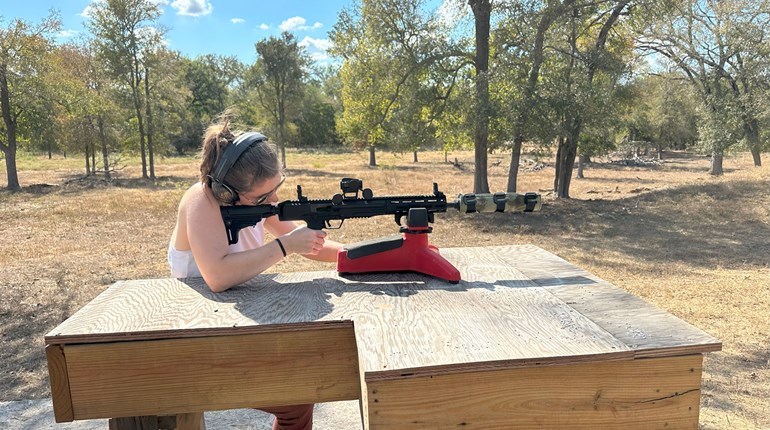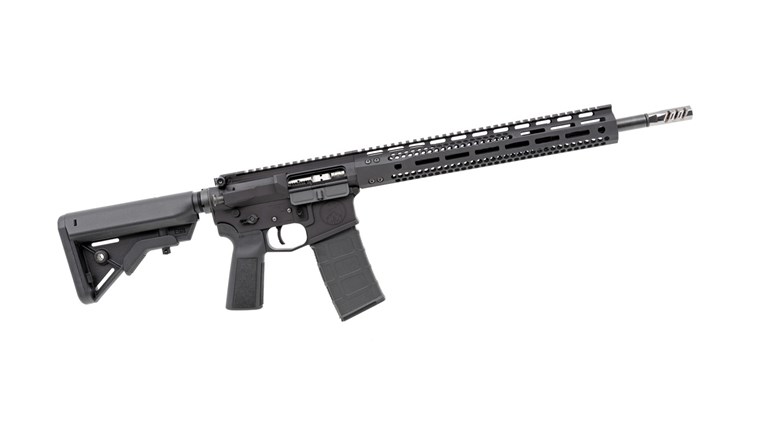
The time has come to assemble! And no, this isn’t a constitutional exhortation vis a vis the First Amendment from the Bill of Rights. Come to think of it, it is an exhortation with regard to the Second Amendment, though that isn’t what we mean, either.
Instead, we’re back with our short/light modern sporting rifle (AR) build, and it’s time to quit talking about disembodied parts, and slap a bunch of them together. This time, we’re concerned mainly with the rear and lower assemblies of the rifle.
As we do so, we get to a crucial revelation (though an exceptionally observant reader could have sussed this out in Part 4)—namely, our choice of an upper and lower receiver. As a big part of our quest is “light,” we’ve opted for an advanced polymer pairing from Kaiser US. When we compare these to a billet set, the net weight saving is nearly half a pound.
We make no claim to have dug these up on our own. Some readers will remember our review of the superb Robar PolymAR-15Ti that used these in combination with other measures to scrape weight to a truly astonishing level (4.6 pounds, if memory serves). Kaiser itself offers two rifles using their long- and short-strand, glass-infused polymer assemblies as well, though we’ve no experience with either.

But as we explained, we were after some different characteristics than any of these factory rigs, yet wanted to cut those metal ounces. Kaiser polymer gets us there with a tight upper/lower fit and impressive tolerances.
Our Law Tactical folder and ARFX “Entry Length” Skeleton Stock looks to be just the combination for which we had hoped—a couple of notches shorter than a fully extended, standard adjustable (or fixed, for that matter), yet solid, solid, solid. We concede it adds some weight back, but at least it is close to the body, and hence more controllable. A more crucial desire—stowed length—is cut by a handsome six to seven-and-a-quarter inches, depending on what you measure against. Extended, it still yields the close-quarters maneuverability we’re after. We can always add the provided pad if the length of pull nettles.
Because of our takedown/pivot pin choice, installation of the Law/ARFX combo was actually simplified—we went with KNS Precision, and therefore dispensed with the regular pin retention hardware.
Depending on what you choose for trigger and safety, what goes in first can actually vary. As a “cassette” system, our Timney has to go in before the short-throw AXTS Talon, so that the end of the trigger bar is under the selector/safety cylinder. If you use a polymer lower, as we did, be sure to get the Timney plate that goes under the trigger housing and protects the floor of your lower from wear from the Timney’s set screws. Our plate required substantial thinning, but we stuck with it in order to take advantage of all the fabled excellence. A third component plays a part in the selector/trigger fitting process—the grip (retaining, as it does, the selector detent and spring). Ultra-light, however, doesn’t have to translate to cheesy or weak, and we go with the Magpul MOE SL. It’s Magpul tough, of course, but very trim.
We also add some other new parts in our back-end assembly. Item one is an ambidextrous magazine release—a jim-dandy from Troy Industries fits our requirements nicely. It adds virtually no weight over the single-sided standard, yet gives the prized identical function when the left hand is running the rifle. Install is no different from the normal part, though we stop a turn short of flush: This gives a slightly longer throw to the mechanism, and accounts for slight differences in magazine dimensions as well as less-than-perfect presses. Don’t enhance this with two turns; your catch can malfunction with this much additional clearance.

A Seekins enhanced bolt catch comes next: Note the assembly order is important here (after the mag release). This looks like a straightforward part to install, but may not be once you get into it—this punch helps a heap, and is worth every penny if it saves an annoying and easy-to-create mar on your lower.
As we said, it’s starting to look like a real rifle now. Next week we’ll put in the rest of the action parts, namely the spring, buffer and bolt, and mate it up with the front end—barrel, gas system and muzzle break.
We might even get a shot off by next time.
Frank Winn has been studying arms and their relationship to tyranny, meaningful liberty and personal security all his adult life. He has also been a competitive shooter and firearms safety/shooting instructor for more than 20 years, though he won’t admit how many more than 20.
Part 1 Part 2 Part 3 Part 4 Part 5 Part 6 Part 7 Part 8 Part 9


































